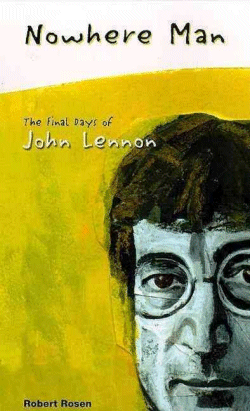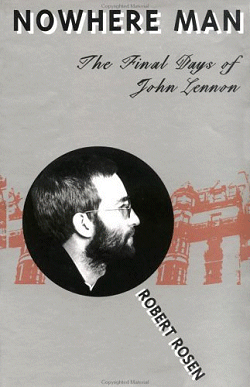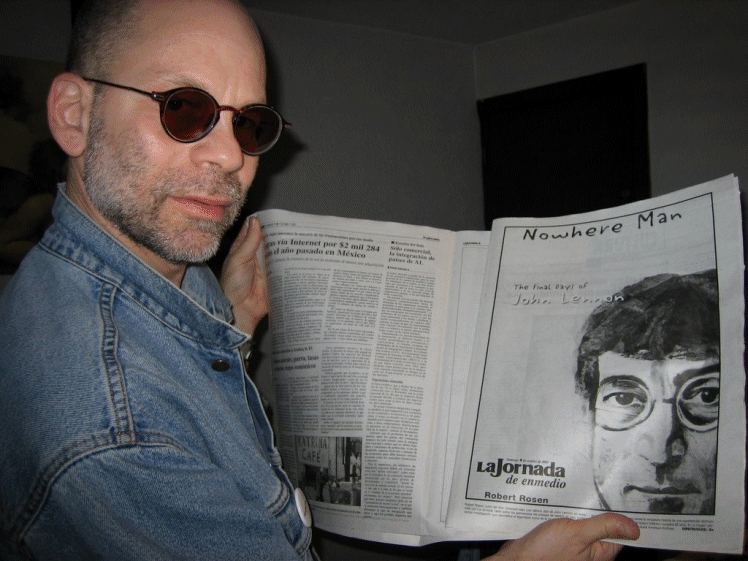Sixties
City presents
a wide-ranging series of
articles on all aspects of the Sixties, penned by the creator of the iconic
60s music paper Mersey
Beat
|
Sixties
City presents
a wide-ranging series of
articles on all aspects of the Sixties, penned by the creator of the iconic
60s music paper Mersey
Beat
|
|||||
|
| Having
access to John's diaries and
other relevant material, did you come to any personal conclusions about
John which were different from your previous opinions? Before Fred Seaman gave me John's diaries, in May 1981, he'd been telling me about John-since the day he started working for him, in February 1979. The picture he originally painted was what I described in the opening paragraph of Nowhere Man: a dysfunctional, "tormented superstar, a prisoner of his fame, locked in his bedroom, raving about Jesus Christ while a retinue of servants tended to his every need." Seaman told me that he thought John was washed up, that he'd never make music again. He thought that Lennon was tired of living and said that he wouldn't be surprised if he committed suicide. All this changed in the summer of 1980, when Seaman was in Bermuda with John, and John started writing and recording the material for Double Fantasy. When I started transcribing John's diaries, much of what Seaman had told me was borne out-especially in John's diary entries from early 1980, when he did seem scattered, unfocused, and confused about what to do next. Still, a number of things surprised me, like how much time and energy John spent writing in his diaries-the diaries were his primary creative activity during his years of seclusion. Though I knew about his interest in numerology, astrology, tarot, etc., I was surprised by how seriously he took these things, especially tarot. And though, of course, I knew about John's rivalry with Paul-in 1979, Seaman started referring to Paul as "the enemy" - I was surprised by how obsessed John was with Paul, how he thought about him virtually every day, and how much pleasure he took when Paul was busted in Japan for marijuana possession. So, if my opinion changed about John, it had to do with how obsessively petty and uncharitable he could be towards Paul. When you completed the book did you need Yoko's approval before finding a publisher? No, I did not need or ask for Yoko's approval; she did not approve the book; and she did not try to stop me from publishing it after I got a publishing deal. Her lawyers, however, did ask to vet the book. My lawyer refused. He'd already vetted Nowhere Man and felt confident that it did not violate any of Ono's rights. In the course of your research you obviously read Albert Goldman's book. How accurate did you consider it? Maybe 20 percent of Albert Goldman's book can be taken at face value. The Lives of John Lennon is composed of little nuggets of truth wrapped in layers and layers of bullshit. Every story he tells is grossly exaggerated to paint John and Yoko in the worst possible light. On reading diaries with such detail in them, did you ever consider John was obsessive about the occult, horoscopes and other borderline psychic studies? There's no question that John was obsessed with the occult: tarot, numerology, magic, and astrology. John and Yoko had a fulltime tarot card reader, whom they called "Charlie Swan." (His real name was John Green.) Yoko met with or spoke to him daily. John usually met with him several times a week, though for an extended period of time, he had Charlie read daily on gold futures. It was Yoko who introduced John to numerology and turned him on to Cheiro's Book of Numbers, which became one of John's "bibles." (John's fascination with number 9 is well known.) When Paul was arrested in Japan for marijuana possession, John attributed the arrest to Yoko's magic, which she'd learned from Lena the Colombian Witch-she'd gone to Colombia with Charlie Swan and paid Lena $60,000 to teach her how to cast magic spells. (Swan, using his real name, writes in detail about Lena in his book, Dakota Days.) And every month, John clipped the Patric Walker horoscopes-Libra for himself, Aquarius for Yoko-from Town and Country magazine, pasted them in his diary, and kept track of how accurate they were. He usually found them extremely accurate. John was a voracious reader. Can you remember any of the books which impressed him in the diaries? There were a number of books that John mentioned in his diaries that impressed him for a variety of reasons. He was very much into "lucid dreaming," or programming dreams (they were often sex dreams about May Pang), which he then would record in his diary. He referred to programming dreams as "dream power." When I was writing Nowhere Man, I didn't realize that Dream Power was the title of a book that taught him how to program dreams. Obviously this book had a powerful influence upon him. John hated wearing glasses and became obsessed with a book about improving his vision through eye exercises. I don't recall the title, but John did do the recommended exercises in spurts, though it didn't improve his vision. He very much enjoyed Black Spring, by Henry Miller, which reminded John of when the Beatles were playing strip joints in Hamburg. He was so impressed by Fear and Loathing in Las Vegas, by Hunter Thompson, he considered playing Thompson in a movie version of the book. And Helter Skelter, by Vincent Bugliosi, about the Manson murders, scared the shit out of John. During your long period of research did you become interested in John's passion for the occult and did you personally try the I Ching, read horoscopes and practice numerology? It was only after I started reading up on the occult that many of the references in John's diaries began to make sense. And yes, I did start reading the horoscopes in Town and Country and I did start paying attention to things like Mercury Retrograde, and I did kind of get hooked on Cheiro's Book of Numbers. That's because numerology was the easiest occult practice to understand and it could be applied to so many situations. Just how difficult was the book to write considering the circumstances? I started writing the book a couple of weeks after Seaman had ransacked my apartment and taken everything I'd been working on. That was when I realized that I had large portions of John's diaries memorized, and I began writing down everything I could remember. The more I wrote, the more I remembered. To me, writing is a painful process, and writing Nowhere Man was no more or less difficult than it was to write any other book I've written. I had the bulk of Nowhere Man written by the end of 1982-though at the time I called it "John Lennon's Diaries." What now appears in the published edition is not all that different from the original manuscript. But because it took me 18 years to find a publisher, I was able to spend that time refining the book, adding more to it as information became available. As I explain in the introduction, new information that I recognized from the diaries was constantly appearing in newspapers, magazines, other books, and especially on the Internet. I assembled all these fragments into a coherent whole, and I had those 18 years to get it right. Though for copyright reasons I was unable to quote from the diaries, I was somehow able to infuse Nowhere Man with the energy, feeling, and tone of the diaries-and that's the magic of the book. At times it felt as if John were dictating to me, as if I'd plugged into his spirit. Did you at any time find that his entries in the diary indicated he was at times involved in a life beset with periods of trivia? I don't know if I'd call it trivia. John had wide-ranging interests and he read a lot of newspapers, everything from The New York Times to the gossip rags. He thought stories about scientists' finding new ways to estimate the age of the universe and about Marlon Brando's gaining weight were equally compelling. He also believed that tabloids like The National Enquirer were more credible than the Times, who he thought got everything wrong. |
 
|
 |
If John had been your idol prior to the involvement in the writing, did
the completion of the book prove cathartic? I was a Beatles fan. The first record album I ever bought, in 1964, right after I saw them on The Ed Sullivan Show, was Meet the Beatles. I played that album enough to memorize every word of every song on it. But I also lost track of the Beatles for years at a time and barely followed them after they broke up. I was more into sports-I wanted to be a sports writer. But even the years when I wasn't paying attention, information was getting through to me subliminally-it was in the air. When John hired Fred, he knew very little about the Beatles-one of the reasons he got the job was because he wasn't a Beatles freak. Fred started asking me a lot of questions about John and the Beatles, and I was surprised by how much I knew about the music and the lore: Who's the Walrus? What's this about Paul being dead? What happens when you play "Revolution 9" backwards? Stuff like that. All I'm saying is that I did not idolize John or any other Beatle, but I knew a lot about them, more than I'd realized. So, it wasn't the completion of the book that was cathartic. It was what happened after it was published: After 18 years of being ripped off, ignored, rejected, threatened, called a liar, and subjected to character assassination, I had a critically acclaimed best-seller in multiple countries and multiple languages. Do you have an opinion on why John constantly referred to his wife as 'mother'? At the risk of sounding like a 10-cent psychoanalyst, I think it's obvious that he looked upon Yoko as a substitute for his real mother. I also think it was a way for John to express his joy that Yoko had given him Sean and that he finally had a real family. It's worth noting that in his diaries, he did not call Yoko "Mother." During the final five year period of John's life which you studied, what were the aspects of John which impressed you and how different a man was he from his Beatles days? What impressed me most about John was his fanatical discipline when it came to writing in his diary-the way he got it all down, day after day. As I said in Nowhere Man, he recorded "every detail, every dream, every conversation, every morsel of food he put in his mouth, the perpetual stream of consciousness." I found this inspiring and tried to emulate that kind of discipline in my own writing. I also found it extremely interesting that despite his $150 million and his global renown, his day-to-day life didn't seem all that different from my own. We were both sitting in a room in Manhattan, writing in notebooks and smoking weed. Of course, when he was talking about household expenses, his numbers had an extra couple of zeros at the end. Obviously, during his Beatle days, when he was recording and touring, he wasn't spending as much time in solitude and isolation. And though he had a wife, Cynthia, and a son, Julian, he was not acting like a real husband or father. This is something he felt guilty about for the rest of his life, especially his relationship, or, rather, lack of one, with Julian. John considered Sean a miracle and saw him as an opportunity to repent for the sins against family that he'd committed when he was a Beatle. In other words, he did his best to be a real father to Sean. Was John accepting of Yoko's companionship with people like Sam Havadtoy and was such a relationship platonic or more intimate? Though Fred Seaman has insisted that Yoko was having an affair with Sam Havadtoy, John did not explicitly state in his diaries that he thought this was the case. He might have suspected something was going on-he'd overhear little snippets of chatter among the servants. But there's nothing definitive and no indication that John ever tried to stop Yoko from spending time with her interior decorators, the "Sams," Havadtoy and Green. |
|
Article
Text
UK
web hosting by
|